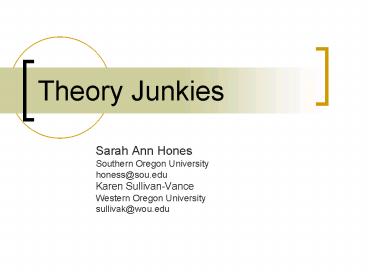Theory Junkies - PowerPoint PPT Presentation
1 / 22
Title: Theory Junkies
1
Theory Junkies
- Sarah Ann Hones
- Southern Oregon University
- honess_at_sou.edu
- Karen Sullivan-Vance
- Western Oregon University
- sullivak_at_wou.edu
2
Theory Junkies
- How often do you consider how theory informs your
advising practice? - Do you want to consider theory as a basis for how
you approach your day-to-day activities? - Are there theorists we should know and examine to
strengthen our approach to working with students
in advising?
3
Necessary Components of an Advising Program
- Intentionality
- Coherency
- Based on theory and knowledge of teaching,
learning, human development - Recognition of Student populations and diversity
- Responsive to student needs
- CAS Standards for Advising (1997)
4
Necessary Components Cont.
- Conceptual
- Relational
- Informational
5
What is theory?
- Theory is a common language for a community of
scholars. - Lee Knefelkamp
- (in Komives and Woodard, (2003), Student
Services A handbook for the profession. San
Francisco Jossey-Bass, page 154.)
6
Toward a Definition of Theory
- Consistency
- Making meaning
- Describing how humans act
- Influencing outcomes
- Explaining outcomes
- Planning and development
7
What is good theory?
- Inclusive
- Useful
- Can be replicated
- Contributes to the understanding of practice
- Relevant to practice
- Limitations are recognized
8
Limitations of Theory
- We are individuals and we work with individuals
- Students should be empowered to make decisions
- Cultural limitations
9
Schools of Student Development Theory
- Cognitive-Structural
- Psychosocial
- Person-Environment
- Humanistic
- Typologies
10
Developmental Theories
- Students
- Colleges/Universities
- Advisors
11
Theorists
- Maslows Hierarchy of Needs
- Deficit Needs
- Physiological
- Safety and
Security - Love and
Belonging - Esteem Needs
- Growth Need
-
Self-Actualization
12
Theorists Cont.
- Chickerings 7 Vectors
- Developing Competence
- Managing Emotions
- Moving through Autonomy toward Interdependence
- Developing mature interpersonal relationships
- Establishing Identity
- Developing Purpose
- Developing Integrity
13
Theorists Cont.
- Kurt Lewin
- Person-Environment Interactions Theory
- Behavior is a function the interactions of a
person and his/her environment. - Nevitt Sanfords Challenge and Support
- George Kuh-Involving Colleges
- Alexander Astin-Student Involvement
14
Theorists Cont.
- Vivienne Cass
- Homosexual Identity Formation Theory
- 6 Stages
- Identity Confusion
- Identity Comparison
- Identity Tolerance
- Identity Pride
- Identity Synthesis
15
Theorists Cont.
- Malcolm Knowles
- Andragogy-how adults learn
- Nancy Schlossberg
- Transition Theory
16
Theorists Cont.
- Marjorie Olney and Amanda Kim
- Disability Identity Theory
- Not one set of disabilities
- Individuals act differently because theyre
treated differently - Identity formation
- Self-concept/perception
- Managing others perceptions
17
Olney and Kim
- Implications of the disability
- Self-definition
- Appraisal of abilities
- Making sense of situations
18
Theorists Cont.
- Terry OBanion and Burns Crookston
- Developmental Advising
19
Theory for Advisors
- Lee Knefelkamp (1990)
- Seasons of Academic Life
- Hones, Sullivan-Vance-Modeling Mentoring, a
developing theory
20
- Development of the whole student is more complex
than one theory or even a cluster of theories can
explain. - Evans, N.J., Forney, D.S. Guido-DiBrito, F.
(1998) Student development in college Theory,
research and practice. San Francisco
Jossey-Bass.
21
Resources on Theory
- Evans, N.J., Forney, D.S. Guido-Di-Brito, F.
(1998) Student development in college Theory,
research and practice. San Francisco
Jossey-Bass. - Komives and Woodard. (2003) Student services A
handbook for the profession. San Francisco
Jossey-Bass
22
Additional Resource on Theory
- NACADA Theory and Philosophy of Advising Interest
Group - Chair Peter Hagen
- Institution Richard Stockton College of New
Jersey - Phone 609-652-4504
- Email hagenp_at_stockton.edu














![[PDF] Uncle John's Bathroom Reader: Extraordinary Book of Facts and Bizarre Information Kindle PowerPoint PPT Presentation](https://s3.amazonaws.com/images.powershow.com/10089808.th0.jpg?_=202408011212)
















